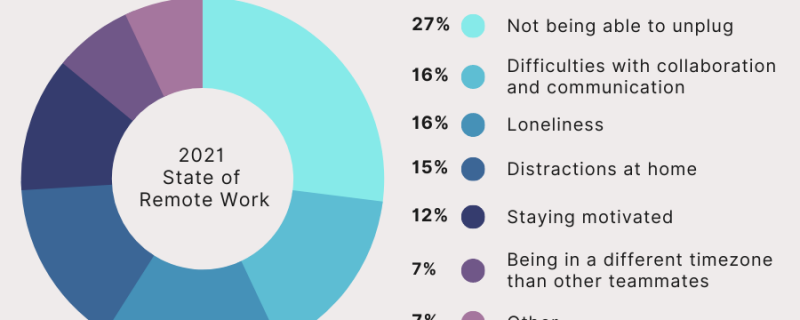Why Some Managers Are Resistant To Work Schedule Flexibility

For many organizations, work schedule flexibility is a new part of their compensation package. It’s a powerful tool in terms of employee engagement, retention and recruiting. Remote and flexible schedules have shown to not only provide employees with higher job satisfaction, but better health, less absenteeism, increased work-life balance and less stress. This is all well and good for workers, but what do managers really think about remote work? While many understand the appeal and benefits, it’s still difficult to embrace change and work through the challenges of managing a remote and/or hybrid team.
Here’s a look at 7 reasons why managers may be resistant to remote work:
- Lack of accountability and supervision: Sure, some team members work well (and in some cases better) working remotely. Then there are those that struggle with time management, distractions and other challenges. Managers may feel that it’s more challenging to supervise employees and keep them accountable when they’re not physically present in the office.
- Loss of collaboration: Face-to-face interaction is often believed to foster a more cohesive work environment. Some managers worry that remote work can make it harder for team members to truly feel like a team. This is of particular concern for new team members and younger workers who are just starting out in their career.
- Lack of company culture: Strong in-office culture can be a key component for an organization’s retention and recruitment. Managers may worry that remote work could be a hinderance towards building this culture.
- Increase in security concerns: There may be concerns about the security of data when employees are working outside the office.
- Decrease in productivity: Some managers may feel that team members are more productive in a controlled office environment. Working from home can potentially have more distractions and chances to break from a traditional work schedule.
- Concerns about equity: In some settings, not all roles can be performed remotely or on a hybrid schedule. Allowing some employees to work from home might create perceived (or actual) inequities among team members.
- Holding onto a traditional mindset: Some managers may still have a traditional view of work that involves all team members being present at a common workplace. Change is hard and personal experiences and beliefs take time to overcome, particularly when it comes to management practices.
As we discussed last month, an annual government-wide survey conducted by the Office of Personnel Management found that more than two-thirds of federal employees are still teleworking at least occasionally. Remote and hybrid work isn’t going anywhere, but neither are the management challenges if your organization doesn’t face them head on. Leah M Joppy and Associates can help you figure out your primary challenges and work with you and your team to make remote/hybrid working a more efficient, productive and collaborative experience!
Call us at 301-670-0051 or email us at leah@lmja.com to learn more.
Why Some Employees Find Remote Work To Be A Challenge

When we think of remote work, many of us think of meetings in our sweatpants, the ability to schedule appointments when we want and not having to sit in traffic for hours. For many, a remote or hybrid schedule is like a dream come true. We’ve looked at the variety of benefits in past articles, among them: work/life balance, increase in productivity, no commute, increased flexibility and autonomy and so much more. And we’ve looked at why offering a remote and/or hybrid schedule is an incredibly effective recruiting and retention tool. But even with all the positives, remote work can present a whole new set of challenges for some employees. Let’s take a look at some of the top 5 remote work complaints:
Con #1: Social isolation
This is probably the number one complaint that employees have about remote work, particularly new workers and young workers who are new in their career. It may be challenging to build strong relationships with colleagues without face-to-face communication, resulting in a sense of disconnection from the team. Social events like happy hours that were once spur of the moment and easy to plan, now take more effort and can end up on the backburner.
Con #2: Work-life boundaries are blurred
While some feel one of the biggest benefits of remote work is work/life balance, others have difficulty unplugging from the office and feeling like they’re always “on call”. It can be difficult to disconnect from work and take breaks when workspace is also a private space. This lack of separation can negatively impact mental well-being if not managed effectively and can lead to burnout.
Con #3: Communication and collaboration are limited
Zoom meetings are all well and good, but some aspects of face-to-face interaction can’t be done remotely. Remote work can make it challenging to build trust through in-person interactions. Some team members may also feel like their access to mentorship, networking and senior leadership opportunities are more limited.
Con #4: Risk of miscommunication
Remote work often involves written communication, which can sometimes lead to misunderstandings or misinterpretations. It may be challenging for remote workers to resolve conflicts effectively without the benefit of immediate in-person conversations.
Con #5: Lack of focus and distractions
While the typical distractions of the workplace may be eliminated, remote work introduces a new set of distractions at home. It’s easy to be distracted from work tasks by household chores, family members or other personal issues. Some workers may not have the space to exclusively dedicate to a home workplace and have to work in busier areas.
Each of us has a unique personality and work style. For every person who enjoys the solitude of working remotely and the freedom that it provides, there’s another who thrives on human interaction or craves the routine and structure of going into the office. That’s why management plays such an important role in implementing a strategic remote/hybrid work strategy and communicating it effectively with team members. Leah M Joppy and Associates is ready to help you reduce the cons of remote work and ensure that team members feel supported and engaged.
Contact us at 301-670-0051 or email us at leah@lmja.com to learn more and get started.
Listening To The Workforce: How To Make Remote Work Successful

There are so many reasons to love remote and hybrid work. For some, it’s rolling out of bed and starting the work day without the hassle of a long, stressful commute. For others, it’s the flexibility of picking up their kids from school or throwing in a load of laundry during lunchtime. Whatever the appeal, remote and hybrid work models are here to stay. Organization must embrace it if they want to remain competitive and recruit new team members. And the numbers back this up:
- According to job site ZipRecuiter, jobs specified as “remote” receive 300% more applications than jobs that are not.
- Organizations that don’t offer any kind of flexible-work options could be losing out on up to 70% of job seekers, according to HR consulting firm Thrive HR.
- Nearly half (45 percent) of government employees will consider looking for a new job if their agency reduces remote and hybrid work flexibility, according to Eagle Hill Consulting research. These findings come on the heels of new federal government guidance that calls for a substantial increase in in-person work, along with unprecedented challenges filling government jobs.
Offering remote/hybrid positions is one thing, but execution is quite another. Once you have new team members in the door, it’s essential that managers know how to lead remote and hybrid workers. No one wants to feel like they’re out of the loop and continuous frustration with communication, technology and overall job satisfaction can lead to turnover. That’s why strong, well-trained leaders are key to the entire process.
When it comes to managing a remote/hybrid team, let’s start with a few of the basics. We’ve outlined a few “dos and don’ts” below. Maybe you’re already using most of them or perhaps they’re a good reminder of where you need to improve:
- Do set immediate and clear expectations. And make sure they’re communicated clearly to everyone.
- Do schedule regular team meetings and make them a priority (no regular cancellations!).
- Do provide necessary resources. Leaders must ensure team members have the technology and other tools they need to succeed in a remote and/or hybrid environment.
- Do engage directly with employees as often as possible. Have an open-door policy and set aside time for one-on-one conversations
- Don’t just have a communication strategy in place, document it and share it. Everyone needs to be on the same page.
- Don’t just encourage feedback, make it a priority. Really take the time to listen to team members.
- Don’t micromanage and make employees feel like they’re not trusted.
Remote and hybrid work schedules only continue to grow in popularity and can be a major recruiting tool when trying to attract new team members. But implementation needs to be done correctly in order to retain workers. Leah M Joppy and Associates can help you figure out your primary challenges and work with you and your team to make remote/hybrid working a more efficient, productive and fun experience! Call us at 301-670-0051 or email us at leah@lmja.com to learn more.
Is There A Future In Remote Work?

Looking ahead, the future of remote work seems to only be increasing and flourishing. According to Upwork, by 2025, an estimated 32.6 million Americans will be working remotely, which is about 22% of the workforce. This projection suggests a continuous, yet gradual, shift towards remote work arrangement
For many organizations, flexibility is a new part of their compensation package and is a powerful tool in terms of employee engagement, retention and recruiting. Remote and flexible schedules not only provide employees with job satisfaction, but better health, increased work-life balance and less stress.
How does the federal government stack up in terms of remote and hybrid work? According to an annual government-wide survey conducted by the Office of Personnel Management,
more than two-thirds of federal employees are still teleworking at least occasionally. About one-third of the over 625,000 people surveyed said they do not telework at all, due to technological limitations, in-office requirements or personal choice. The remainder, about 68%, telework at least occasionally and most people said they telework three to four days per week.
Even as calls for in-person work have pushed leaders to reconsider remote work policies, they seem reluctant to do so. Remote and hybrid work benefits employers through higher productivity levels, decreased turnover and reduced absenteeism. And as we saw in our previous article, remote and hybrid positions equal more job applicants. Here are a few other ways that it benefits government agencies:
- Ease with recruiting: Public sector recruitment isn’t always easy. Sometimes salaries are less competitive than the private sector, causing many potential hires to consider working for businesses instead. In offering a fully-remote or hybrid work structure, government agencies can increase the odds of finding an ideal candidate.
- Casting a wider hiring net: With work from anywhere a reality, organizations can hire candidates anywhere in the world who will have the skills and qualifications needed, even if they don’t live there. The best may not live within driving distance of the office, but that shouldn’t be a barrier to employment.
- Increasing diversity in the workplace: Studies have shown that groups, including women, people of color and those with disabilities, view remote work positively. Allowing staff to work from anywhere instantly increases the diversity of your candidate pool and removes obstacles to employment such as lack of transportation.
Recruitment and retention in today’s competitive hiring landscape can be a challenge. A strong remote and hybrid workplace can be just the tool your organization needs to attract a larger pool of qualified candidates. Leah M Joppy and Associates can help you create an effective recruitment strategy that outlines your remote workplace model and why potential new hires should work for you! Contact us at 301-670-0051 or email us at leah@lmja.com to learn more and get started.
Social Media Content: Career Advice For The Younger Generation?
 Whether you love or hate social media or choose to not participate altogether, there’s no question it has a profound influence on younger generations. It’s a part of life for Gen Z and doesn’t just affect their buying habits and pop culture tastes. It’s also where they often turn for career advice.
Whether you love or hate social media or choose to not participate altogether, there’s no question it has a profound influence on younger generations. It’s a part of life for Gen Z and doesn’t just affect their buying habits and pop culture tastes. It’s also where they often turn for career advice.
In October 2023, ResumeBuilder.com surveyed 1,000 full-time workers aged 21 to 40 regarding how TikTok has influenced their career decisions. The numbers speak for themselves. No surprise here: Gen Zers are more likely to make decisions based on TikTok creators. The survey revealed about 41% of those who use TikTok have made career decisions based on information they’ve seen on the app. At least 88% of people who took TikTok advice said it had a positive impact on their lives, 10% said it was neutral and just 2% said those decisions worked out negatively.
Last month, we looked at several TikTok employment trends that gained popularity last year, including “Quiet Quitting”, “Lazy Girl Jobs” and “Bare Minimum Mondays”. All three involved Gen Z’s quest for work/life balance, setting boundaries and sticking to their job description. Here are two other big employment trends that organizations should be aware of as they look to attract and retain the next generation of workers:
- “Managing Up”: This is by no means a new concept, but it took TikTok by storm last year. The hashtag #managingup currently has 5.5 million views and career advisors on the platform are promoting it as a key to making your job suit your needs. “Managing up” is understanding your manager’s working style and adjusting your own approach to make both your day-to-day jobs easier. Essentially, it’s about creating, maintaining and improving a working relationship with your boss.
- “Boreout”: What do you do when you realize your dream job isn’t all it’s cracked up to be? For Gen Z, it’s airing your frustrations on platforms like TikTok. The hashtag #boredatwork had about 470 million views as Gen Zers shared the mundane and repetitive aspects of their job. This disenchantment is often called “boreout” and can be equally as harmful as burnout. Lack of stimulation in a role can lead to negative feelings about an organization and higher rates of turnover.
Keeping up with social media employment trends can seem like an impossible task, particularly when they seem to change by the day. But when it comes to what Gen Z is looking for in the workplace, the message is pretty clear: work/life balance is key, meaningful work is important and flexible schedules are in demand. How can your organization attract and retain Gen Z workers? It’s one of the top questions Leah M Joppy and Associates receives from clients.
While LMJA realizes the federal sector has little flexibility in hiring practices, we have been very successful with helping our federal customers make minor tweaks in the interview process that can increase the chances of selecting a successful candidate that will stay around awhile! We’re ready to improve your 2024 recruitment strategies with tactics that will help you understand this younger generation and what they really want in the workplace.
Want to learn more? Call us at 301-670-0051 or email us at leah@lmja.com.
How To Work With The Digital Generation
 Did you know that Gen Z, the group born between 1997-2012, represents 32% of the global population and will account for 27% of the workforce by 2025? These “digital natives” have been shaped by social media, the COVID-19 pandemic and an uncertain financial landscape. Their unprecedented access to information and communication has shaped their behaviors, expectations, and perspectives. And, as we saw in our article above, it has also shaped the way they approach career advice and the workplace.
Did you know that Gen Z, the group born between 1997-2012, represents 32% of the global population and will account for 27% of the workforce by 2025? These “digital natives” have been shaped by social media, the COVID-19 pandemic and an uncertain financial landscape. Their unprecedented access to information and communication has shaped their behaviors, expectations, and perspectives. And, as we saw in our article above, it has also shaped the way they approach career advice and the workplace.
For many employers, Gen Z can be a tough group to figure out. What are they looking for in a career? If they’re hired, how can organizations make sure they don’t jump ship quickly? Gen Z tends to be socially conscious and values diversity, inclusion and sustainability. They seek purpose and meaning in their careers, placing a strong emphasis on personal growth, continuous learning and making a positive impact.
Last month, we looked at a few of the top things younger job seekers are looking for in the workplace. Here, we’ll look at 3 proven ways to keep them once they’re in the office:
- Assign projects that align with their passions and values: Taking the time to understand the individual passions and values of your Gen Z employees will help ignite their motivation. When assigning projects, consider their interests and align them with their core values.
- Provide regular feedback and progress updates: Gen Z employees want to know how they’re performing. It’s important to provide regular, specific feedback on their work and progress, highlighting their strengths and areas for improvement. Also, providing progress updates will give them a clear understanding of how their work contributes to the larger goals of the organization.
- Give them autonomy and ownership: Micromanaging Gen Z is the first step towards showing them the door. These younger employees thrive when given autonomy and will be empowered if they can take the lead on projects and make decisions. It shows that you value their input and believe in their capabilities – and it goes a long way with this generation.
Gen Z also prefers consuming information in bite-sized, easily digestible formats. Offering “microlearning” opportunities is a great way to cater to this preference. Examples include: breaking down training materials, onboarding and development resources into shorter modules or interactive formats.
As you look at your hiring strategies for 2024, how are you approaching attracting and retaining Gen Z employees? It may not be something you’ve thought a lot about and you may feel that the same old tactics will be “good enough”. Not taking the time to get to know the wants and needs of Gen Z can really put your organization at a disadvantage. Leah M Joppy and Associates is ready to help you hone your Gen Z recruitment strategy and will look at your current workplace environment, culture and more to make suggestions as to how you can attract younger team members. Call us at 301-670-0051 or email us at leah@lmja.com to learn more.
Insights Into Working With Or Hiring Gen Z For Your Organization

Gen Z can seem like a mystery to many of us, whether you have one at home, you’re trying to hire a recent college graduate to work for your organization or you have a few on your team. Their attitude towards a traditional 9-5 schedule, desire for flexibility in order to create work/life balance and general frustration with “hustle culture” has made them question workplace norms. In most cases, they are not interested in continuing down the same path as older generations. And Gen Z is not afraid to voice their feelings and shake up the professional world – particularly on TikTok.
There’s no doubt Gen Z has seen their fair share of upheaval in the workplace. They’ve witnessed or been a part of the rise in remote work during the pandemic and the increasing abandonment of it throughout the last several months, as well as waves of layoffs as the economy slowed. They’re asking tough questions, like “does life have to be like this?” and they’re concerned about how to prioritize their health and wellness in a system they feel is unsympathetic to work/life balance.
If you’re interested in gaining some insight into the way Gen Z views today’s workplace, look no farther than TikTok. Here’s a look at a few of the top TikTok work trends that went viral over the last year:
- Quiet Quitting: Essentially this is “phoning it in”. Quiet quitting is characterized by employees putting in the bare minimum effort to keep their jobs, but not devoting any extra time or energy to their roles. Popularized on TikTok in 2022, quiet quitting refers to employees doing their jobs, but not “going the extra mile” or doing anything that falls outside of their job descriptions.
- Lazy Girl Jobs: This viral trend racked up millions of views after 26-year-old TikToker Gabrielle Judge shared it with her followers in May. Judge defines a “lazy girl job” as a flexible, remote position that’s non-technical, high-paying and doesn’t require extreme effort or difficult performance goals. She used examples of job titles like “customer success manager” and “marketing associate” that fit the “lazy” job category.
- Bare Minimum Mondays: “Bare Minimum Mondays” are another example of Gen Zers placing a priority on their health and wellbeing instead of the notion of being an “ideal employee”. Digital content creator and startup founder Marisa Jo Mayes went viral on TikTok when she shared her version of Bare Minimum Monday, essentially doing as little work as possible that day to minimize stress.
Whether you’re sympathetic to the views of Gen Z or feel these beliefs are self-entitled and out of touch, they still need to be considered in order to hire and retain a younger generation of workers. In fact, it’s one of the top challenges Leah M Joppy and Associates hears about from clients. How do we attract younger workers? And how do we keep them after they’ve started in a new position? We’ll examine what Gen Z is looking for in the workplace in our next article, but the first step towards recruitment and retention is learning and understanding more about this rapidly growing pool of workers. That’s where we can help by taking a look at your current hiring strategies and how to best tailor them to appeal to the younger generation of employees.
Ready to learn more? Call us at 301-670-0051 or email us at leah@lmja.com.
How To Attract Gen Z Workers

“She’s quiet quitting and rage applying to lazy-girl jobs.” That sentence may cause many of us to scratch our heads in bewilderment, but to Gen Z workers, it makes perfect sense. And with workplace hashtags like these going viral among Gen Z on TikTok, it makes managers wonder if it’s even possible to make younger workers happy.
So, who exactly is Gen Z? Often defined as people born between 1997-2012, they are more diverse, tolerant, educated and socially conscious than past generations, yet they also report higher levels of stress and mental illness. They’re also one of the largest generations, making up one-fourth of the U.S. population. In fact, they’re about to surpass millennials as the most populous generation on earth and have the potential to transform not just the job recruitment process, but also the industries they’re entering.
The big question is: What is Gen Z looking for in the workplace? Forget the massage chairs and ping pong tables. Gen Z is more focused on meaningful work with an emphasis on work/life balance. Our previous article about workplace TikTok trends is proof of that. Here’s a look at 5 of the top things younger job seekers are looking for at work:
- A competitive salary, but meaningful work is key: With rent, groceries and other essentials at all-time highs, Gen Z places a premium on a good salary. However, while salary is the most important factor in deciding on a job, Gen Z values salary less than every other generation. If given the choice of accepting a better-paying, but boring job versus work that was more interesting but didn’t pay as well, Gen Z was fairly evenly split over the choice.
- A strong benefits package: Along with salary, this is another key to keeping Gen Z employees satisfied at work. Health insurance should be just the start – you should also offer employee retirement plans, commuter benefits, and more. Throw in some free meals or snacks in the workplace and you’re really going to get their attention!
- Reasonable working hours: Gen Z is less willing than millennials to sacrifice work/life balance. Frequently asking this group to work more than their usual hours can be a real motivation killer and lead to workplace burnout. You don’t want a group of “quiet quitters” on your team.
- No micromanagement and toxic work environments: A study by Glassdoor showed Gen Z isn’t too enthusiastic about upper management. That means if you micromanage these workers, you’re likely to chase them out the door. They’re also very conscious of toxic work environments (ie- employees who are too afraid to ask questions, dismissive managers, etc.)
- A flexible work schedule: Even if you can’t keep your team remote all the time, it’s important to give Gen Z the option. For example, you could implement a policy that allows employees to work from home any time they don’t have in-person meetings. That flexibility can go a long way to keep them engaged at work.
Understanding the needs and wants of Gen Z can seem like a big learning curve. However, ignoring their workplace preferences can really put your organization at a disadvantage. As we pointed out, they’re poised to become a large block of the workforce in the coming years. Leah M Joppy and Associates is ready to help you hone your Gen Z recruitment strategy and will look at your current workplace environment, culture and more to make suggestions as to how you can attract younger team members. Call us at 301-670-0051 or email us at leah@lmja.com to learn more.
When A Leader Leaves The Organization
 We’ve probably all experienced the stress of a key leader or team member leaving their position, whether it’s a sudden departure or an impending retirement. It can cause uncertainty within an organization and can really rock the boat. Team members have questions about the future and how changes will affect them and their jobs. And there’s the added challenge of finding the right person to fill a vacant position with the required skills and expertise. What if there was a way to make this type of situation easier to handle? It’s called succession planning and it’s a vital, yet often overlooked, tool in helping your organization run smoothly.
We’ve probably all experienced the stress of a key leader or team member leaving their position, whether it’s a sudden departure or an impending retirement. It can cause uncertainty within an organization and can really rock the boat. Team members have questions about the future and how changes will affect them and their jobs. And there’s the added challenge of finding the right person to fill a vacant position with the required skills and expertise. What if there was a way to make this type of situation easier to handle? It’s called succession planning and it’s a vital, yet often overlooked, tool in helping your organization run smoothly.
What is succession planning? It’s the process of identifying critical positions within your organization and developing an action plan for team members to be ready to fill those positions should they become available. Think of it as an insurance plan that you have the right people in the right jobs when you need them. However, it’s not a one and done kind of task. An effective succession plan should be reevaluated and updated each year or when changes dictate.
There are so many benefits to succession planning, yet many organizations don’t take the time and care required to build an effective plan. However, putting in the effort reaps so many rewards, including the following:
- Helps your organization plan for the future: Change can happen fast and so many organizations are caught off guard when a key team member leaves. With succession planning, leaders continually think about how certain events can affect their department as a whole and it makes them more resilient in the face of unexpected events.
- Assists with knowledge transfer: When a long-time employee retires or leaves for another position, they take their knowledge with them. Succession planning helps to stop this drain on organizations by having future candidates who are ready to take the reins. It opens up the opportunity for mentoring, coaching and education on what it takes to be successful in a future role.
- Promotes training and development: Once your company has identified team members that are interested in moving into senior positions, you can identify any competency gaps and begin preparing them for their eventual roles. This may come in the form of coaching, mentoring, job shadowing or a gradual increase in more advanced responsibilities. Some positions may require certifications or continuing education.
- Helps with long-term talent planning and employee retention: Succession planning improves retention of your top employees by offering them clear opportunities for growth. By planning longer-term, organizations can reduce their reliance on external recruitment and have a pool of experienced employees in-house.
Changes in your team are inevitable. You may not always be able to predict an employee’s departure, but with effective succession planning, you can help achieve continuity and lessen the impact on your organization. Does your department have a succession plan in place? If so, when’s the last time it was updated? Leah M Joppy and Associates can work with your organization to develop an effective succession plan or review your current plan and make suggestions for improvements. We get to know your department and unique needs and walk you through every step of the process (you’ll see a few examples in our next article).
Succession plans are easy to let fall through the cracks, but don’t be caught off-guard if you lose a key member of your team. Contact us at 301-670-0051 or email us at leah@lmja.com to learn more.
Tips For Successful Succession Planning
 An aging workforce, shrinking talent pool and intensified competition for the right team members put so many organizations under increasing pressure. The benefits of succession planning have never been more apparent, yet few organizations have a plan at all, even for senior leadership positions. With the right plan in place, you can rest a little easier knowing that you’re prepared for inevitable personnel changes and won’t be caught off guard.
An aging workforce, shrinking talent pool and intensified competition for the right team members put so many organizations under increasing pressure. The benefits of succession planning have never been more apparent, yet few organizations have a plan at all, even for senior leadership positions. With the right plan in place, you can rest a little easier knowing that you’re prepared for inevitable personnel changes and won’t be caught off guard.
How can your organization get started with succession planning? Here are a few tips for kickstarting an effective plan:
- Identify potential roles to plan for: The first step is to identify the critical positions within your organization. Sometimes these positions are leadership roles or they’re mid-level. You should identify roles where the operation, strategy and decision-making of your organization would be dramatically affected if they were to be suddenly empty.
- Define succession criteria: Criteria includes the skillset, experience and training required for potential successors. Does the role need someone with specific technical expertise? Perhaps you need successors with strong leadership skills or the ability and willingness to develop those skills? These criteria act as your benchmark for evaluating the readiness of candidates to fill your roles.
- Pinpoint succession candidates: Think about which team members could potentially step into the identified positions. Ask yourself: If we were to hire for a position internally, who could possibly step into the role? You want to carefully evaluate employees’ performance, potential and readiness to take on higher-level responsibilities.
- Step up professional development efforts: Now that you’ve identified your talent pool, it’s time to focus on the training to get them to where they need to be. This typically involves creating a personalized development plan for potential successors to enhance their skills and knowledge required for future leadership roles.
- Develop a knowledge transfer process: This opens up opportunities for mentoring and coaching for successors and ensures that specialized knowledge and skills don’t leave when a team member walks out the door. Experienced leaders can guide and support successors in their professional growth, while sharing their knowledge and experiences.
- Review and monitor your plan: Regularly monitoring the progress of the succession plan is vital to its success. This typically involves tracking the development and performance of potential successors, evaluating their readiness for advancement and then making any adjustments to the plan.
- Continually update your plan over time: As we mentioned before, succession planning is not a one and done process. It requires review at least yearly to analyze any areas that need adjustment.
Most of all, it’s vital to be proactive with a plan! Sometimes, you’ll know well in advance if a hard-to-replace team member is going to leave. But other times, you’ll be caught off-guard by a sudden employee departure. That’s why you need a plan now. Leah M Joppy and Associates can help you every step of the way with your succession planning. Drafting a succession plan can feel like a daunting task, but with the right coach working with you through the process, it doesn’t have to be. And the result means you won’t have to deal with the upheaval that can come with personnel changes.
Ready to learn more? Call us at 301-670-0051 or email us at leah@lmja.com.